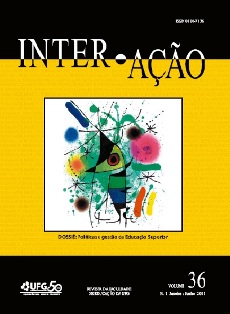SOLIDARIEDADE E EDUCAÇÃO NO PROJETO AMIGOS DA ESCOLA: A ÓPTICA DAS PROPOSTAS EDUCACIONAIS NEOLIBERAIS
DOI :
https://doi.org/10.5216/ia.v36i1.15036Résumé
O objetivo deste texto é o de apresentar uma discussão preliminar sobre o Projeto Amigos da Escola. O projeto, que teve início em 1999, é uma iniciativa da Rede Globo de Televisão, que o desenvolveu concomitantemente com o Projeto Brasil 500 Anos e o Comunidade Solidária, e destina-se a fortalecer a participação comunitária no esforço de melhoria da escola pública. Nesse sentido, pretende-se nesta análise preliminar questionar três aspectos que se desdobram em inúmeros outros também de extrema importância, e ponderar sobre eles, pois são fundamentais para a compreensão do projeto hegemônico neoliberal, que se consolidou em torno do tema solidariedade vinculado às questões educacionais: a tentativa do Estado de eximir-se de suas obrigações, repassando à comunidade a responsabilidade pelo funcionamento e manutenção da escola pública; a tentativa de privatização da escola pública, sob o argumento da falta de qualidade e do alto custo em relação ao benefício que proporciona para a população; a tentativa de denegrir a imagem dos profissionais da educação que atuam nas escolas públicas, bem como de questionar sua necessidade e função nas instituições escolares públicas, com a conclamação dos cidadãos para suprir as funções daqueles profissionais.Téléchargements
Téléchargements
Publié-e
Comment citer
Numéro
Rubrique
Licence
A Inter-Ação utiliza como base para transferência de direitos a licença Creative Commons Attribution 4.0 para periódicos de acesso aberto (Open Archives Iniciative - OAI). Por acesso aberto entende-se a disponibilização gratuita na Internet, para que os usuários possam ler, baixar, copiar, distribuir, imprimir, pesquisar ou referenciar o texto integral dos documentos, processá-los para indexação, utilizá-los como dados de entrada de programas para softwares, ou usá-los para qualquer outro propósito legal, sem barreira financeira, legal ou técnica.
Autores que publicam neste periódico concordam com os seguintes termos:
1) Autores mantém os direitos autorais e concedem à revista o direito de primeira publicação, com o trabalho simultaneamente licenciado sob a Licença Creative Commons Attribution que permite o compartilhamento do trabalho com reconhecimento da autoria e publicação inicial nesta revista.
2) Autores têm autorização para assumir contratos adicionais separadamente, para distribuição não-exclusiva da versão do trabalho publicada nesta revista (ex.: publicar em repositório institucional ou como capítulo de livro), com reconhecimento de autoria e publicação inicial nesta revista.
3) Autores têm permissão e são estimulados a publicar e distribuir seu trabalho online (ex.: em repositórios institucionais ou na sua página pessoal) a qualquer ponto antes ou durante o processo editorial, já que isso pode gerar alterações produtivas, bem como aumentar o impacto e a citação do trabalho publicado.















